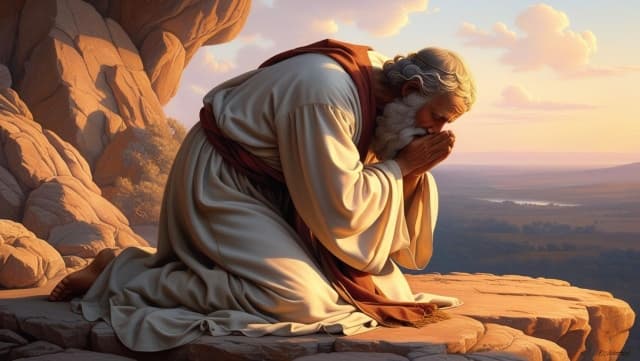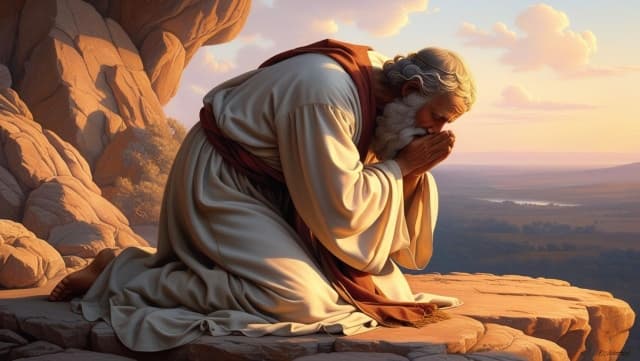Micah and God’s Case Against the People – Part 4

The present post is the fourth and final post on my study on the book of Micah. The three previous studies on this series are as follow:
The Book of the Prophet Micah – Part 1
The Book of the Prophet Micah – Part 2
Micah and the False Prophets – Part 3
Throughout his ministry, Micah proclaimed how the people of Judah had sinned against God by breaking the demands of the covenant. The leaders of Judah had used their political power to oppress the poor and deprive them of their inheritance, “Alas for those who devise wickedness and evil deeds on their beds! When the morning dawns, they perform it, because it is in their power. They covet fields, and seize them; houses, and take them away; they oppress householder and house, people and their inheritance” (Micah 2:1–2).
The false prophets had given false hopes to the people, “‘Do not preach’ – thus they preach – ‘one should not preach of such things; disgrace will not overtake us’” (Micah 2:6). Micah condemned the false prophets who were preaching empty words to the people, “If someone were to go about uttering empty falsehoods, saying, ‘I will preach to you of wine and strong drink,’ such a one would be the preacher for this people’” (Micah 2:11).
Micah condemned the political and religious leadership of Judah by calling them “social cannibals”: “Listen, you heads of Jacob and rulers of the house of Israel! Should you not know justice? – you who hate the good and love the evil, who tear the skin off my people, and the flesh off their bones; who eat the flesh of my people, flay their skin off them, break their bones in pieces, and chop them up like meat in a kettle, like flesh in a caldron” (Micah 3:1–3).
After presenting the sins and failures of the people of Judah, Micah summoned the people and presented God’s case against his people, “Hear, you mountains, the controversy of the LORD, and you enduring foundations of the earth; for the LORD has a controversy with his people, and he will contend with Israel” (Micah 6:2).
The Hebrew word rîb is used to refer to a legal case. Micah, acting as a prosecuting attorney on behalf of God, brought Israel to the divine court to allow both parties, God and the people, to present their case.
Israel’s rebellion against God made it impossible for the people to appreciate God’s goodness and abide by the demands of the covenant. In this formal accusation against the people, Yahweh asked the people to present their case against him, “My people! What wrong have I done you? What hardship have I caused you? Testify against me. For I brought you up from the land of Egypt, and redeemed you from the house of slavery; and I sent before you Moses, Aaron, and Miriam” (Micah 6:3–4).
Yahweh also reminded the people of how he intervened when Balak, king of Moab, tried to get Balaam, the false prophet, to bring curses upon them. God’s indictment against the people challenged them to examine what God had done in their past to see if God had abandoned them or had failed to keep his promises.
Micah’s proclamation was a declaration that God had not abandoned his people, but that his people had abandoned God. Micah proclaimed that the sins of the nation was not limited to the wealthy and ruling class of Judah. The whole nation was guilty of violating the demands of the covenant and were indifferent to the mercy and goodness of God.
In their response against God’s indictment, the people defended themselves by declaring that they were willing to please God with more and better offerings, even with the sacrifice of their sons, “With what shall I come before the LORD, and bow myself before God on high? Shall I come before him with burnt offerings, with calves a year old? Will the LORD be pleased with thousands of rams, with ten thousands of rivers of oil? Shall I give my firstborn for my transgression, the fruit of my body for the sin of my soul?” (Micah 6:6–7).
In response, to the people’s question on how to please God, Micah told the people that God was not interested in empty sacrifices, but rather that he desired justice and righteousness, “You have already been told what is right and what Yahweh wants of you. Only this, to do what is right, to love mercy and to walk humbly with your God” (Micah 6:8).
The first requirement of what God expected from the people refers to the moral obligation that existed among the members of the covenant community. Justice was expected of those people who were joined together in a community bound by the bonds of the covenant. To do justice was to do what was right according to the demands stipulated in the covenant between God and Israel.
The third requirement, “To walk humbly with God” refers to a way of life in which an individual does not live independently of God but lives within the will and ways of God. This expression also means to live in a personal relationship with God. Enoch walked with God (Genesis 5:22) and so did Noah (Genesis 6:9).
The second requirement requires an explanation. The Lord requires that his followers “love mercy.” But, what does it mean “to love mercy”? The English dictionary defines “mercy” as “the compassionate or kindly forbearance shown toward an offender,” “pity,” “benevolence,” and “an act of kindness or compassion.” However, here Micah is not saying that the Lord is requiring “kindness” or “pity.” The Lord requires these things from his followers, but not in Micah 6:8.
The word “mercy” is a translation of the Hebrew word hesed. The word hesed is used in the Old Testament to describe God’s faithful commitment to Israel even when the nation was unfaithful to God. The word is also used to describe the conduct God expected from each Israelite: “For I desire loyalty [hesed] and not sacrifice” (Hosea 6:6). In the context of Micah’s words to the people, the word hesed should be translated “commitment,” “faithfulness,” “loyalty.”
So, what God requires of his followers is not sacrifice or something material that can be quantified and understood as a way of bribing God. What God requires of his people is hesed, faithfulness and commitment to the relationship established by the covenant. He requires the giving of one’s life to him and to his way of life and that one rejoice in living that kind of life.
The book of Micah concludes with the word “woe” in chapter 7:1. Micah speaks as a lonely man; he has no company except God. The prophet is like a person searching for food in the fields and vineyards after the harvest, but there was no food to be found. Micah’s lamentation is an expression of the social situation where there was a search for help in which a godly person could not be found; not even friends or family could be trusted.
In his lament, Micah describes the corruption and the evil he found in Judah. The nation was filled with violence, deception, and dishonesty: “Faithful people are gone from the earth, and no one is decent. All people lie in ambush to commit murder. . . . Their hands are skilled in doing evil. Officials ask for gifts. Judges accept bribes. Powerful people dictate what they want. . . . A son treats his father with contempt. A daughter rebels against her mother. A daughter-in-law rebels against her mother-in-law. People’s enemies are the members of their own families” (Micah 7:2–6).
In the midst of the many problems Micah found among the people of Judah, Micah’s faith and trust in Yahweh remained firm, “But I shall look to Yahweh, my hope is in the God who will save me; my God will hear me” (Micah 7:7). Micah prayed to God to help and protect his people, “Oh, shepherd your people with your staff, your very own flock” (Micah 7:14).
By calling on Yahweh as the shepherd of Israel (Psalm 80:1), Micah was saying that the deliverance of Judah was not in the hands of the king, but in the saving power of God. Yahweh responded to the prophet’s prayer, assuring him that he will deliver his people, “I will perform miracles for them as in the days of your exodus from the land of Egypt” (Micah 7:15).
Micah finished his oracles with a hymn praising Yahweh’s compassion and forgiveness, “Who is a God like you, who pardons sin and forgives the transgression of the remnant of his inheritance? You do not stay angry forever but delight to show mercy. You will again have compassion on us; you will tread our sins underfoot and hurl all our iniquities into the depths of the sea. You will be true to Jacob, and show mercy to Abraham, as you pledged on oath to our fathers in days long ago” (Micah 7:18–20).
Micah began his song of praise with a question that reflected his own name. The name Micah means “Who is like Yahweh.” Micah’s question, “Who is a God like you?” reflects Micah’s faith in God who is a God merciful and gracious, a God who is slow to anger, a God who abounds in steadfast love and faithfulness, and a God who forgives iniquity and transgression and sin (Exodus 34:6–7).
Conclusions
Micah ministered in the Southern Kingdom during the eighth century BCE. His message of judgment shows that the primary responsibility for God’s judgment against Judah can be attributed to the wealthy and the ruling class for their injustices against the poor and the most vulnerable people of Judah. The focus of Micah’s message was the mistreatment of the oppressed and of the poor. The sin of oppression and social injustice was a serious violation of the covenant, a violation that deeply affected Israel’s relationship with God.
Micah began his ministry during a period of great economic prosperity in Judah. However, the moral and social conditions of Judah in the eighth century triggered the need for social and religious reforms and a recommitment to the righteousness and justice required by God. This was the focus of Micah’s ministry.
Micah, however, offered the people a message of hope and salvation if the people would repent and return to faithful obedience to God. Throughout Micah’s ministry, his message repeatedly turned from accusation and judgment to promise and hope. The destruction of Jerusalem did not occur during the days of Micah. The delayed judgment was due to Hezekiah’s reforms, which were influenced by the powerful preaching of Micah (Jeremiah 26:18–19).
According to Micah, God’s salvation would come from Bethlehem, with the birth of a new David. Micah’s prophecy of a ruler to be born in Bethlehem was fulfilled in the birth of Jesus Christ, and through him the promise of future universal peace.
All Posts on This Series:
The Book of the Prophet Micah – Part 1
The Book of the Prophet Micah – Part 2
Micah and the False Prophets – Part 3
Micah and God’s Case Against the People – Part 4
NOTE: For other studies on the prophet Micah, read my post Studies on Micah the Prophet.
Claude Mariottini
Emeritus Professor of Old Testament
Northern Baptist Seminary
NOTE: Did you like this post? Do you think other people would like to read this post? Be sure to share this post on Facebook and share a link on Twitter or Tumblr so that others may enjoy reading it too!
I would love to hear from you! Let me know what you thought of this post by leaving a comment below. Be sure to like my page on Facebook, follow me on Twitter, follow me on Tumblr, Facebook, and subscribe to my blog to receive each post by email.
If you are looking for other series of studies on the Old Testament, visit the Archive section and you will find many studies that deal with a variety of topics.












